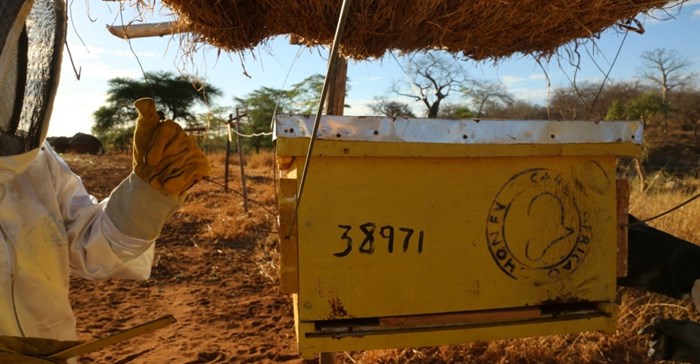When the David Sheldrick Wildlife Trust asked British Airways if it could help build a fence, it agreed. It provided the funding because this was a honey fence, which is a very simple and effective solution to an age-old problem. The problem is elephants, or more specifically what happens when populations of wild elephants come into contact with rural farmers.
In the Tsavo East National Park in Kenya, this had become an all too common occurrence, when elephants followed their exceptional sense of smell to track down vegetables or harvested bags of maize from farmers’ fields. For the subsistence farmers, an elephant raid can be devastating. Elephants can consume up to 400kg of food a day.
The farmers respond by shouting, lighting fires, exploding firecrackers, releasing dogs, hurling stones or chili bombs and banging drums or metal sheeting. If this doesn’t work they might resort to spears or bow and arrows. The encounters can result in people and elephants being killed or injured.
Electric or other fencing isn’t ideal. It is expensive, to erect and maintain. Fences can also cut wildlife corridors, resulting in overgrazing and permanent damage to ecosystems. Confining elephant herds can cause population explosions with consequences for the elephants, other wildlife, and the ecosystem.
By contrast bees are easy to keep, don’t disrupt wildlife migration, provide farmers with another source of income and – most importantly – elephants dislike them.
The beehive fence project
In 2014 with £5,000 of British Airways funding the David Sheldrick Wildlife Trust, in consultation with Dr Lucy King, an expert in elephant conservation, piloted the beehive fence project.
The farmers in the area were desperate for a solution and very receptive to the idea. The local tribe are also avid beekeepers and were enthusiastic about getting modern beehives from which they could earn an income.
Initial indications were positive, showing the fences to be at least 80% effective, with only two of every ten elephants finding a way through. During project visits, local farmers would point to the footprints of elephants that had walked up to and along the fence before turning back towards the park. In 2016, British Airways provided additional grant money for the construction of another 2.6km of beehive fencing protecting farms in Iviani and Kyusiani villages, close to the border of the National Park. The new fences brought the total number of beehives to 131.
A testing year
It was also the year when the concept would be thoroughly tested as Tsavo experienced one of its longest droughts and highest temperature in recorded history, forcing hungry elephants to forage further afield. At the same time, a new railway line being built across Tsavo constricted elephant movements. The high temperatures and limited water also affected the bees, so there was not enough honey to be harvested.
The good news was that even empty hives have proved to be a deterrent as elephants relate the hives to bees and avoid the fence. Farmers in the area said they would not have planted anything if the fence had not been in place, as they could not afford to have the elephants destroy their crops.
The British Airways’ donation also provided equipment and protective clothing for the communities working with the hives. Since the drought, the first ‘Elephant Friendly Honey’ has been harvested and packaged for sale at the David Sheldrick Wildlife Trust’s gift shop in Nairobi.
“People ask me why an airline is involved with elephants,” says Sophie Onyango, British Airways’ business development manager in Kenya. “The answer is tourism and a simple, clever solution to the human-elephant conflict can only be beneficial for everyone.”





























